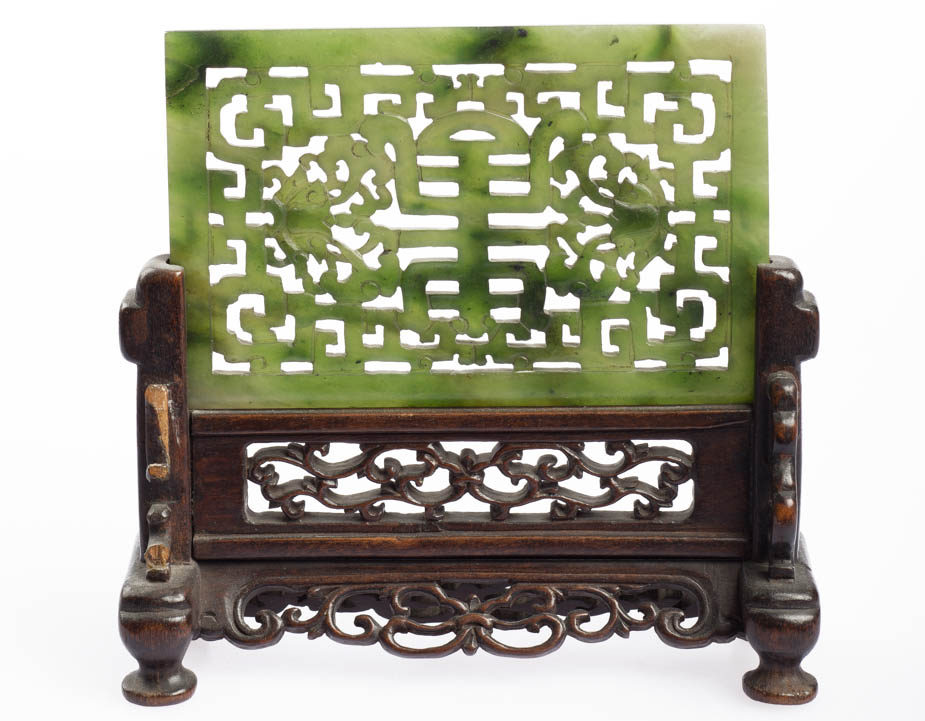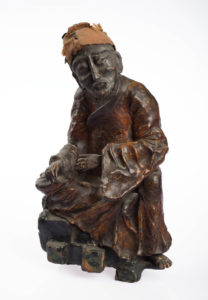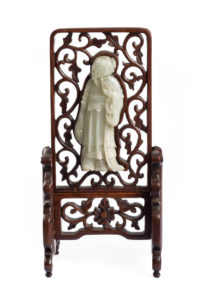“I cannot face with comfort the idea of life without work, work and the free play of the imagination are for me the same thing, I take no pleasure in anything else. (…) Hence, in spite of all the acceptance of fate which is appropriate to an honest man, I have one quite secret prayer: that I may be spared any wasting away and crippling of my ability to work because of physical deterioration. In the words of King Macbeth, let us die in harness.”
Freud in a letter to Oskar Pfister, 6th March, 1910

Freud’s Chinese jade screen, Qing Dynasty, XIX century. It features a Chinese character representing shou – longevity.

Figure of a taoist sage, Chinese, XIX century. Wood and textile.
The joys and sorrows of later life
Throughout his life Freud feared old age and infirmity. He was also sceptical about treating older patients, arguing that above the age of fifty “the elasticity of the mental processes, on which the treatment depends, is as a rule lacking” (1905). Yet his own life is an inspiring story of tremendous courage, extraordinary creativity and openness until the very last days in London, while his thought-provoking writings on memory, fantasy and desire shed new and interesting light on the joys and sorrows of later life.
On the first Sunday of October, the Freud Museum joined the nation-wide celebrations of old age called Silver Sunday, by offering a free house tour dedicated to exploring Freud’s intriguing and often contradictory views on the “gruesome business of getting old” (1935).
House Tour
As part of the tour, visitors were given the opportunity to see images of the objects from Freud’s collection associated with the theme, such as figures of old Chinese sages and scholars occupying prominent positions around his desk, or the original gifts he received on each of his ‘painful’ birthdays.

Chinese scholar screen, Qing Dynasty, XIX century. Jade and wood.
The object that sparked particular curiosity was a nineteenth century jade screen, featuring a Chinese character representing shou – longevity. It sits centre-stage on Freud’s desk and is likely to have been the second object smuggled out of Vienna by Princess Marie Bonaparte before Freud’s escape from the Nazis in 1938 (the first one being the figurine of the Greek goddess Athena).
Freud’s own words, from his works and personal letters, lead the visitors around his final home, as they engage with the topics that he explored in greater depth, with more or less obvious relation to ageing – the intricacies of intergenerational family dynamics, our ever-developing relationship with our own dreams and childhood fantasies, the vicissitudes of memory, mourning and melancholia or the inevitable but – according to Freud – hardly gloomy transience of things.
Visitors reflected on their own fears and fantasies associated with old age and enjoyed giving them a psychoanalytic twist. Many were very moved to hear about Freud’s extraordinary 16-year-long battle with cancer of the palate.
Tailored Outreach Sessions
The Freud Museum has always been an interesting destination for senior visitors, many of whom find it surprising that Freud was 82 when he arrived in England as a refugee. We have a commitment to engaging with topics resonating with the challenges met by the elderly in contemporary society. This has been reflected in our public and educational programmes of talks, conferences and facilitated visits for groups of pensioners. Our Education Team have been delivering psychoanalytically-informed intergenerational projects and workshops and, more recently, tailored outreach sessions for the elderly. We are looking forward to expanding our dedicated offer for senior visitors, including launching a dementia-friendly house tour.
Silver Sunday House Tour
Join us on Sunday 6 October for our Silver Sunday House Tour. As part of the the nation-wide Silver Sunday celebrations of old age we are offering a dedicated house tour exploring Freud’s intriguing views on the joys and sorrows of later life.



